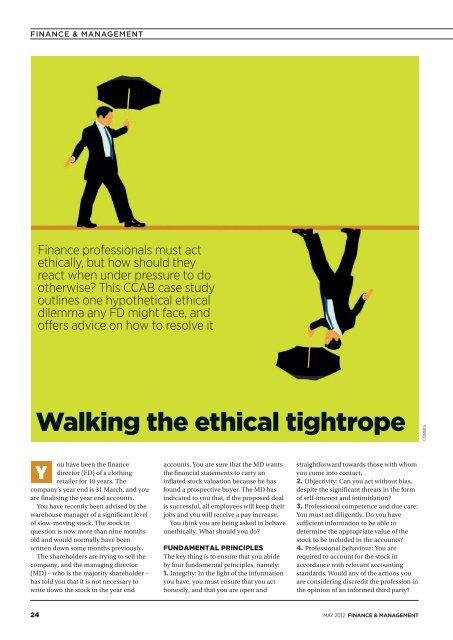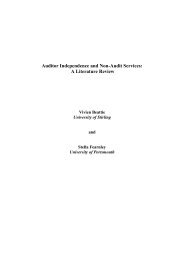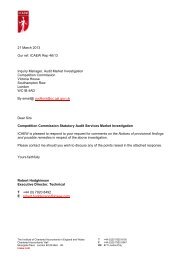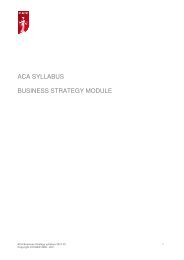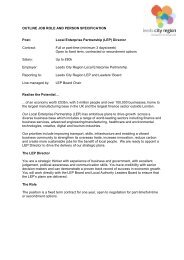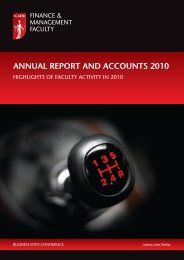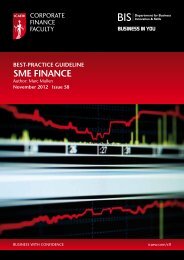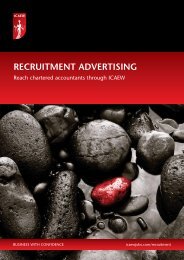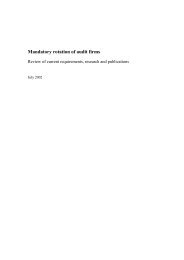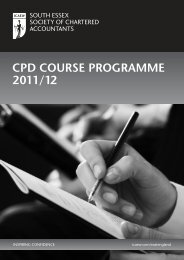Hit the road Positive leadership for troubled times - ICAEW
Hit the road Positive leadership for troubled times - ICAEW
Hit the road Positive leadership for troubled times - ICAEW
Create successful ePaper yourself
Turn your PDF publications into a flip-book with our unique Google optimized e-Paper software.
FINANCE & MANAGEMENT<br />
Finance professionals must act<br />
ethically, but how should <strong>the</strong>y<br />
react when under pressure to do<br />
o<strong>the</strong>rwise? This CCAB case study<br />
outlines one hypo<strong>the</strong>tical ethical<br />
dilemma any FD might face, and<br />
offers advice on how to resolve it<br />
Walking <strong>the</strong> ethical tightrope<br />
CORBIS<br />
Y<br />
ou have been <strong>the</strong> finance<br />
director (FD) of a clothing<br />
retailer <strong>for</strong> 10 years. The<br />
company’s year end is 31 March, and you<br />
are finalising <strong>the</strong> year end accounts.<br />
You have recently been advised by <strong>the</strong><br />
warehouse manager of a significant level<br />
of slow-moving stock. The stock in<br />
question is now more than nine months<br />
old and would normally have been<br />
written down some months previously.<br />
The shareholders are trying to sell <strong>the</strong><br />
company, and <strong>the</strong> managing director<br />
(MD) – who is <strong>the</strong> majority shareholder –<br />
has told you that it is not necessary to<br />
write down <strong>the</strong> stock in <strong>the</strong> year end<br />
accounts. You are sure that <strong>the</strong> MD wants<br />
<strong>the</strong> financial statements to carry an<br />
inflated stock valuation because he has<br />
found a prospective buyer. The MD has<br />
indicated to you that, if <strong>the</strong> proposed deal<br />
is successful, all employees will keep <strong>the</strong>ir<br />
jobs and you will receive a pay increase.<br />
You think you are being asked to behave<br />
unethically. What should you do?<br />
FUNDAMENTAL PRINCIPLES<br />
The key thing is to ensure that you abide<br />
by four fundamental principles, namely:<br />
1. Integrity: In <strong>the</strong> light of <strong>the</strong> in<strong>for</strong>mation<br />
you have, you must ensure that you act<br />
honestly, and that you are open and<br />
straight<strong>for</strong>ward towards those with whom<br />
you come into contact.<br />
2. Objectivity: Can you act without bias,<br />
despite <strong>the</strong> significant threats in <strong>the</strong> <strong>for</strong>m<br />
of self-interest and intimidation?<br />
3. Professional competence and due care:<br />
You must act diligently. Do you have<br />
sufficient in<strong>for</strong>mation to be able to<br />
determine <strong>the</strong> appropriate value of <strong>the</strong><br />
stock to be included in <strong>the</strong> accounts?<br />
4. Professional behaviour: You are<br />
required to account <strong>for</strong> <strong>the</strong> stock in<br />
accordance with relevant accounting<br />
standards. Would any of <strong>the</strong> actions you<br />
are considering discredit <strong>the</strong> profession in<br />
<strong>the</strong> opinion of an in<strong>for</strong>med third party?<br />
24<br />
MAY 2012 FINANCE & MANAGEMENT


